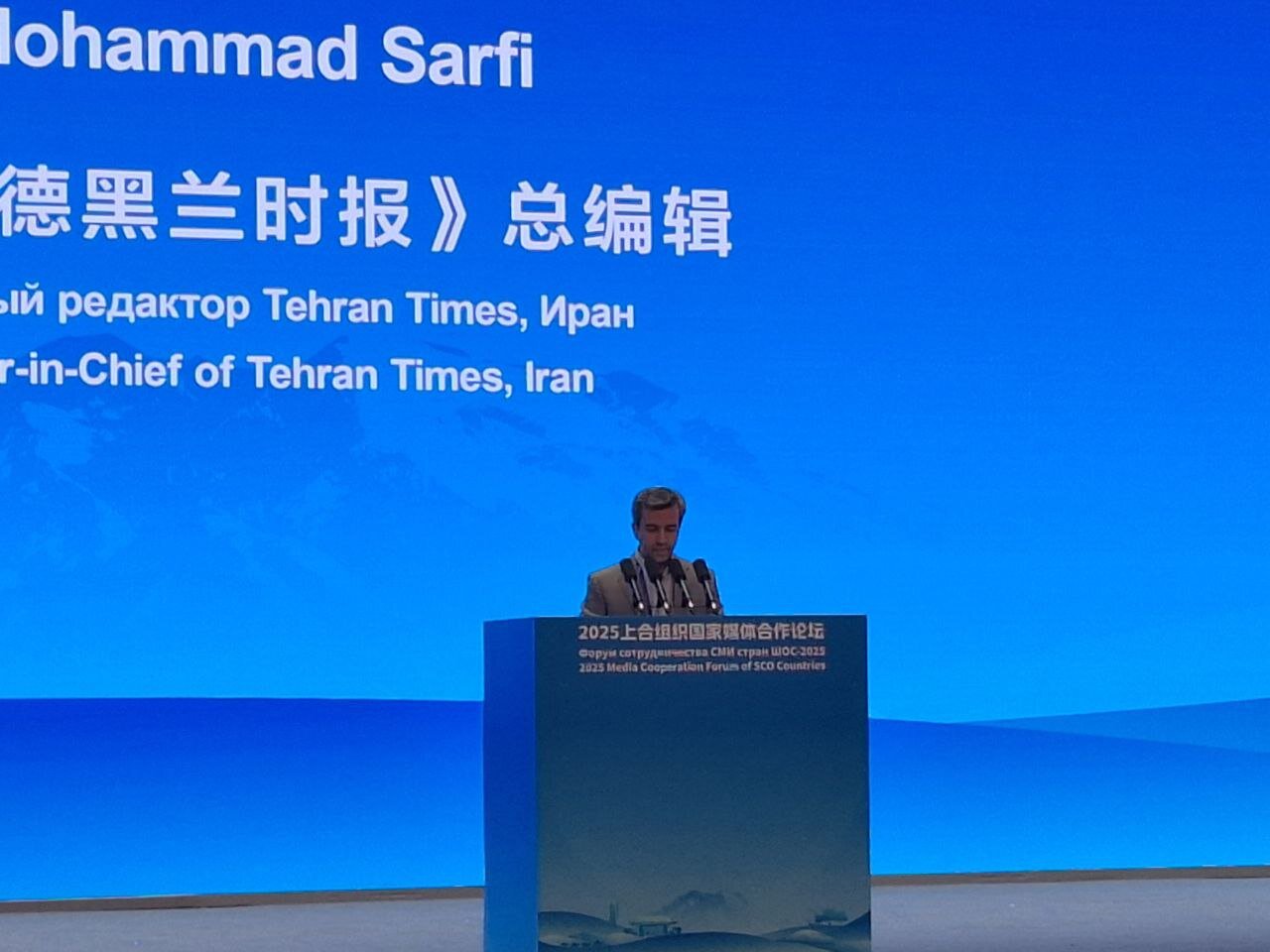Tehran Times chief blasts Western media’s Gaza 'moral failure' at SCO forum in China

URUMQI, China — “When we rely on media frameworks hostile to our realities, we surrender our regional narrative to those who seek to fragment us,” declared Mr. Mohammad Sarfi, Editor-in-Chief of the Tehran Times, during his keynote speech at the 2025 Shanghai Cooperation Organization (SCO) Media Cooperation Forum on Friday.
The event, themed 'Building a Better Home Together for a Prosperous Future,' drew over 300 delegates from 26 countries, including member states such as Iran, observer nations, and dialogue partners.
Held in China’s Xinjiang Uygur Autonomous Region, the gathering underscored the bloc’s push for a multipolar media landscape.
During his speech at the SCO media summit, Tehran Times editor‐in‐chief Mr. Sarfi called for a fairer media landscape among SCO members.
Emphasizing the urgent need to overcome the dominance of external narratives, he warned against relying on Western outlets to shape how neighboring SCO countries are understood.
He asked: “Why do we turn to CNN, BBC, or The New York Times to understand the culture, politics, or society of a neighboring SCO country, rather than to each other’s media?”
Mr. Sarfi explained that Western media—shaped by their own ideological frameworks, national interests, and cultural assumptions—often reduce SCO societies to simplistic stereotypes or mere geopolitical talking points.
He cautioned that internalizing these distortions not only perpetuates mistrust but also undermines regional coherence by benefiting those who thrive on a divided Global South and a fragmented Eurasia.
Charting a path forward, Mr. Sarfi outlined a threefold alternative:
I. Building robust regional media networks: He called for direct cooperation among news agencies, broadcasters, and journalists within the SCO, including exchange programs, co-productions, and regular dialogue.
II. Embracing New Technologies: He stressed the need to harness artificial intelligence, big data, and translation tools to overcome linguistic and technical barriers—thereby breaking the English-language monopoly by enabling real-time multilingual reporting.
III. Establishing a shared media code of ethics: He urged SCO countries to adopt a media charter that emphasizes accuracy, balance, and cultural sensitivity while countering disinformation and propaganda without replicating it.
Commenting on the evolving media landscape, Mr. Sarfi observed that although digital platforms have democratized voices, they often reduce complex realities to hashtags and headlines.
He noted that traditional media—especially newspapers with their institutional memory, structured analysis, and commitment to nuance—have a renewed mission: to offer clarity, reflection, and in-depth reporting that the immediacy of digital platforms often lacks.
Drawing deeply from Iranian culture and literature, Mr. Sarfi recited a verse by the great 13th-century poet Saadi Shirazi. He read the verse in Persian first and then offered its translation: “The sons of Adam are limbs of a frame, for in creation, from one soul they came.”
He explained that this verse—displayed at the United Nations—is a timeless reminder that humanity is one body and that the suffering of one part must be felt by all.
Referring to the ongoing war against Gaza as a tragic example, Mr. Sarfi stated: “Despite devastating scenes, much of the world’s media has chosen to look away or distort the narrative, softening the language of war crimes and allowing silence to replace moral clarity.”
He warned that this failure has prolonged pain and muted the global conscience, stressing that media must not only report but also awaken and help us feel why events matter.
For SCO countries, he concluded that strengthening regional media cooperation offers a critical opportunity to create a media space rooted in truth and humanity.
From security bloc to Eurasian integration engine
Established in 2001, the SCO initially focused on regional security but has since evolved into a pillar of Eurasian integration, promoting the “Shanghai Spirit” of mutual trust, equality, and respect for civilizational diversity.
With Iran joining as a full member in 2023 after 18 years as an observer, the bloc now spans 10 nations—including China, Russia, India, and Pakistan—representing over 40% of the global population and 20% of its GDP.
Iran’s membership positions it as a critical bridge linking West Asia, South Asia, and Central Asia, with its strategic corridors like the International North-South Transport Corridor (INSTC) offering transformative trade routes for SCO economies.
Co-hosted by People’s Daily and the Xinjiang regional government, the forum featured a youth cultural exchange launch and the release of the “Common Home” report, which revealed over 80% of SCO citizens view the bloc as a positive force in global governance.
Though the forum's significance remains undiminished, there was a subtle concern regarding language inclusivity.
Persian, spoken by 110 million people in the region, was not included in the official translations.
This presents an opportunity for future gatherings to further embrace the diverse linguistic landscape of the SCO community.
The forum coincided with Iran’s escalating SCO engagement, highlighted by Secretary-General Nurlan Yermekbayev’s visit to Tehran days earlier.
Yermekbayev gave an exclusive interview to the Tehran Times, during which he reiterated that "Iran contributes to SCO's capacity to strengthen peace, security, and stability."
He also met Iranian Foreign Minister Abbas Araghchi and participated in the Tehran Dialogue Forum.
Leave a Comment